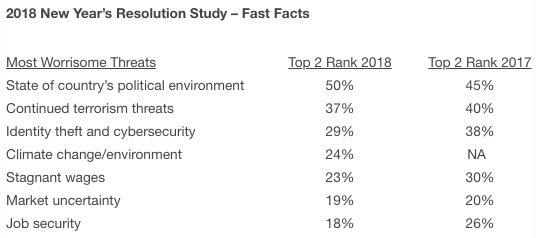Despite the recent performance in the stock market and talks of a looming recession in the coming year, Americans are less focused on their finances. According to the New Year’s Resolution Study from Allianz Life Insurance Company, fewer Americans are troubled about financial issues like stagnant wages (23%) and job security (18%) than they were in 2017 (30% and 26%, respectively). More Americans plan to focus on their health/wellness rather than financial stability, with nearly half (49%) of Americans choosing health/wellness as their top priority for 2019 versus 27% who chose financial stability. This is the biggest difference between the two choices in the past six years of the study.

The changes in the survey results from the previous year are largely driven by millennial optimism. Last year, 37% of millennials listed stagnant wages and job security as one of their most worrisome threats. This year, only 29% and 24% listed stagnant wages and job security, respectively, as one of their most worrisome threats. Millennials also made significant improvements in good financial habits. The percentage of millennials that listed spending too much as their worst financial habit dropped from 45% in 2017 to 31%. The percentage of millennials that have issues with not saving any money also dropped from 32% last year to 24% this year.
At a high level, this survey provides a guide to how companies should think about employee benefits. It highlights areas that employees want to improve in, and by doing so, it creates a framework for how companies can help their employees thrive. As is usually the case for New Year’s resolutions, health and wellness ranks at the top, providing further evidence on the importance of employee wellness programs in attracting and retaining talent. Although financial wellness seems to be less of a concern, many employees still are struggling with it and recognize that professional guidance could be incredibly helpful. When asked which professional is most desired if given free access in 2019, financial professionals topped the list along with nutritionists at 43%. This clearly shows that employees want assistance in achieving their goals, which largely relate to health and well-being. Companies can help deliver this assistance through their employee wellness program, which can include elements of total well-being.












